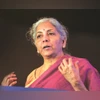On the first day of the two-day discussion in the Rajya Sabha to mark 75 years of the Constitution, Finance Minister Nirmala Sitharaman faulted the economic policies that the Congress governments led by Jawaharlal Nehru and Indira Gandhi pursued, saying that those very policies kept the Indian economy weak for the first five decades of independent India.
Initiating the discussion the “Glorious Journey of 75 Years of the Constitution of India” in the Rajya Sabha, Sitharaman said: "The Soviet model, which the Congress Party copied under Prime Minister Nehru (and it) continued with Indira Gandhi, was a model which did not do any good to this country.”
In her nearly 80-minute speech, Sitharaman said the Congress keeps questioning the Sangh Parivar about its role during the freedom movement. "We all know it, and we've said it, but I want to ask the Congress, what is your role in India's economic freedom? What is India's economic growth? What is your effort in building the economic strength of India,” she asked. The minister said the Congress dumped the “licence quota raj” later on and brought economic reforms.
"You don't have to reform if it was so good, it was damaging the Indian economy and socialism was, therefore, brought into the Constitution's preamble through the 42nd Amendment Act, only to prove that they are doing the right thing...," she added. The finance minister said the economic policies followed by Congress governments for 50 years did not strengthen the economy.
Sitharaman said the Congress carried out major amendments to the Constitution to brazenly help the "family" and the "dynasty", and curbed freedom of expression in the initial years of independent India, pointing to the arrests of actor Balraj Sahni and poet Majrooh Sultanpuri. She also termed the Congress as "anti-women" for not passing the Women's Reservation Bill under pressure of its coalition partners.
Later, speaking in the House, Leader of Opposition (LoP) in the Rajya Sabha and Congress President Mallikarjun Kharge accused Prime Minister Narendra Modi of misleading the country by "twisting facts" about Nehru's letter on reservation to states and demanded an apology. He said the Bharatiya Janata Party (BJP) was indulging in the “bhakti”, or blind worship, of the PM, which is leading the country towards dictatorship. Kharge credited the policies of the Congress government that paved the way for reservation for women in Parliament and legislative assemblies. He alleged that the BJP was against reservation and that is why the party is against caste census. He countered the PM for his speech in the Lok Sabha on Saturday during which the latter claimed that there was no elected government from 1947-1952 when the Congress “illegally” amended the Constitution. Kharge said the first amendment in the Constitution was done to provide reservation to Scheduled Castes and Scheduled Tribes, fix problems related to education and employment, and abolish zamindari system.
Several Opposition MPs, in their respective speeches, said the government is attacking the federal structure and undermining constitutional bodies. Congress’ Abhishek Manu Singhvi said his party has admitted that mistakes were made during the Emergency, but it is “not a logical” argument, which the government proffers, that they will commit the same mistakes because the Congress governments did so. He said the country was in the grip of an undeclared Emergency, and that it has never witnessed the kind of "vendetta politics" that it is experiencing now.

)